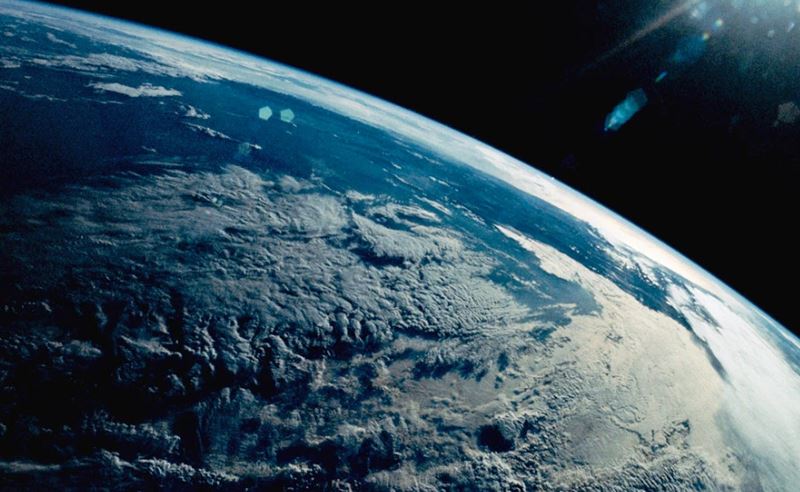The quest for extraterrestrial life often hinges on the presence of water, a fundamental ingredient for life as we know it. However, a new study suggests that the genesis of Earth-like planets, characterized by a harmonious balance of land and water, may require a surprising abundance of water in their formative stages. This revelation challenges conventional notions and sheds light on the intricate processes that shape planetary evolution.
The Aqueous Paradox: A Surfeit of Water Breeds Earth-like Worlds
Contrary to the intuitive notion that Earth-like planets simply need a moderate amount of water, researchers have discovered that a significant surplus of water is necessary for the emergence of continents and oceans. In a paper published on arXiv.org, planetary scientist Keavin Moore and his colleagues at McGill University reveal that the “sweet spot” for water content lies between three and eight times the volume of Earth’s oceans.
This seemingly paradoxical finding stems from the complex interplay of geological and atmospheric processes that occur during a planet’s early development. As a planet cools and solidifies, water vapor in the atmosphere condenses and precipitates, forming oceans. However, a substantial portion of the water is absorbed into the planet’s molten mantle, a vast reservoir hidden beneath the surface.
The Mantle’s Aqueous Vault: Shielding Water from Stellar Fury
The mantle, a layer of semi-solid rock beneath the planet’s crust, plays a crucial role in safeguarding water from the harsh radiation of young stars. Many exoplanets, particularly those orbiting red dwarf stars, are bombarded by intense stellar flares and winds that can strip away their atmospheres and oceans. However, water stored in the mantle remains protected, shielded from the ravages of space.
As the star matures and its activity subsides, water gradually outgasses from the mantle, replenishing the atmosphere and oceans. This process ensures a steady supply of water over billions of years, creating the conditions necessary for the emergence of continents and the potential for life.
Simulating Planetary Evolution: A Window into Watery Worlds
To unravel the intricacies of planetary water cycles, Moore and his team developed a sophisticated simulation that tracks the evolution of water from a planet’s molten beginnings to its mature state. The simulation accounts for various factors, including the initial water content, the intensity of stellar radiation, and the geological processes that drive water exchange between the mantle and the surface.
The results of the simulation reveal a fascinating spectrum of outcomes depending on the initial water endowment. Planets with less than three times Earth’s oceans tend to desiccate, their water lost to space or trapped in the mantle. Conversely, planets with more than eight times Earth’s oceans may become water worlds, entirely submerged beneath a global ocean.
The Goldilocks Zone of Water: A Delicate Balance for Habitability
The sweet spot of three to eight times Earth’s oceans represents a Goldilocks zone for water content. Within this range, planets are likely to develop a stable hydrosphere with both oceans and continents. This delicate balance is crucial for the emergence of diverse ecosystems and the potential for life to flourish.
The discovery of this Goldilocks zone has profound implications for the search for habitable exoplanets. It suggests that astronomers should not only focus on planets with moderate amounts of water but also consider those with seemingly excessive water reserves. These water-rich worlds may harbor hidden oceans beneath their surfaces, potentially teeming with life.
Key Insights
| Aspect | Description | Significance |
|---|---|---|
| Water Abundance | Earth-like planets may require 3-8 times Earth’s oceans of water. | Challenges the conventional view of water requirements for habitability. |
| Mantle’s Role | Mantle acts as a reservoir for water, shielding it from stellar radiation. | Explains how water can persist on planets with active stars. |
| Planetary Evolution | Simulated evolution reveals diverse outcomes based on initial water content. | Provides insights into the formation of Earth-like and water worlds. |
| Goldilocks Zone | Sweet spot of water content for developing oceans and continents. | Refines the search for habitable exoplanets. |
| Implications for Life | Hidden oceans on water-rich planets could harbor life. | Expands the possibilities for extraterrestrial life beyond Earth-like environments. |
Export to Sheets
Summary
The emergence of Earth-like planets with a harmonious balance of land and water may necessitate a surprising abundance of water in their formative stages. The mantle plays a crucial role in safeguarding water from stellar radiation, ensuring a steady supply over billions of years. Simulations of planetary evolution reveal a Goldilocks zone of water content, essential for the development of oceans and continents. This discovery has significant implications for the search for habitable exoplanets and the potential for life beyond Earth.

Basant Kumar Sahoo is a seasoned writer with extensive experience in crafting tech-related articles, insightful editorials, and engaging sports content. With a deep understanding of technology trends, a knack for thought-provoking commentary, and a passion for sports, Basant brings a unique blend of expertise and creativity to his writing. His work is known for its clarity, depth, and ability to connect with readers across diverse topics.



